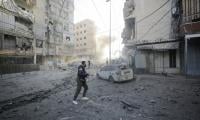Sindh Chief Minister Syed Murad Ali Shah on Friday discussed with a World Bank delegation led by its Country Director Najy Benhassine the need for increasing the storage capacity of the Keenjhar Lake to manage the ever-increasing water demand of Karachi.
According to a statement issued by the Sindh government, the CM told the World Bank delegation that the Keenjhar Lake was crucial for providing drinking water to Karachi and its surrounding areas.
The two sides discussed a proposed project that includes improving the KB Feeder lower canal system, extending the Keenjhar Lake area, and developing social and environmental plans. The World Bank has expressed support for the project, whose cost has been estimated at $300 million.
The meeting was told that the pre-feasibility of modernisation of right bank canals of the Sukkur Barrage had been carried out under the Sindh Water Sector Improvement Project (WSIP), and its detailed feasibility would be carried out under the ongoing Sindh Water and Agriculture Transformation Project (SWAT) at an estimated cost of $200 million. Irrigation Minister Jam Khan Shoro briefed the meeting on the Keenjhar Lake expansion and KB feeder improvement projects.
10-year strategy
The CM and World Bank team discussed a 10-year engagement strategy called the Country Partnership Framework (CPF) 2025-34 to achieve five different goals.
The goals include reduced child stunting, reduced learning poverty, more resilience to climate change, de-carbonisation of the economy and more inclusive job opportunities. The meeting was told that the objective of initiating reduced child stunting initiative was to improve access to basic health, diversified nutrition and family planning services. The other objective was to improve access to clean water, sanitation services and hygiene.
Under the component of reduced learning poverty, access to quality schools and foundational learning would be improved. Education Minister Sardar Shah informed the meeting that the education department was working to increase equitable access to quality early childhood education, and primary and secondary education to promote social cohesion and provide greater opportunities for learning modern skills to marginalised groups, particularly girls and women.
The CM said that the education department was also working to improve the quality of learning outcomes by strengthening the teaching and learning process through innovations. Under the component of resilience to climate change, the agriculture sector would be made more resilient to water scarcity and drought. The project would also help increase resilience to floods and disasters.
The meeting was informed that the component of de-carbonisation of the economy aimed at providing access to cleaner and more sustainable energy while reducing air pollution from sources such as transportation and industry.
Transport Minister Sharjeel Memon reported that 50 electric buses had been added to the Peoples Bus Service fleet with plans to add more buses to decrease environmental pollution in the city.
He also shared details about the transportation projects under way in the city. Sindh Energy Minister Nasir Shah discussed the renewable energy projects implemented in the province, highlighting the establishment of solar parks to supply affordable and clean energy to households and government offices.
It was said that under the component of inclusive job opportunities, fiscal space would be increased for sustainable macro-fiscal management. The component would also enhance productivity and increase private investment in exports, including the agricultural value chain. The CM and World Bank team decided to review the projects again in the next meeting when the provincial departments would have completed their homework.
A general aerial view of a commercial district in Karachi. — AFP/FileWorld Culture FestivalThe Arts Council of...
Sindh Police chief Ghulam Nabi Memon. — Sindh Police website/ File Sindh Police chief Ghulam Nabi Memon on Friday...
Representational image of an ambulance moving on a road. —APP/FileA series of tragic incidents in Karachi on Friday...
A massive traffic jam at National Stadium road in Karachi on June 29, 2024. — APPIn anticipation of a significant...
The image shows one of schools run by Citizens Foundation . — APP/FileThe Citizens Foundation , a leading...
Sindh PPP President Nisar Ahmed Kuhro. — APP/File The Pakistan Peoples Party will hold a large public meeting on...







